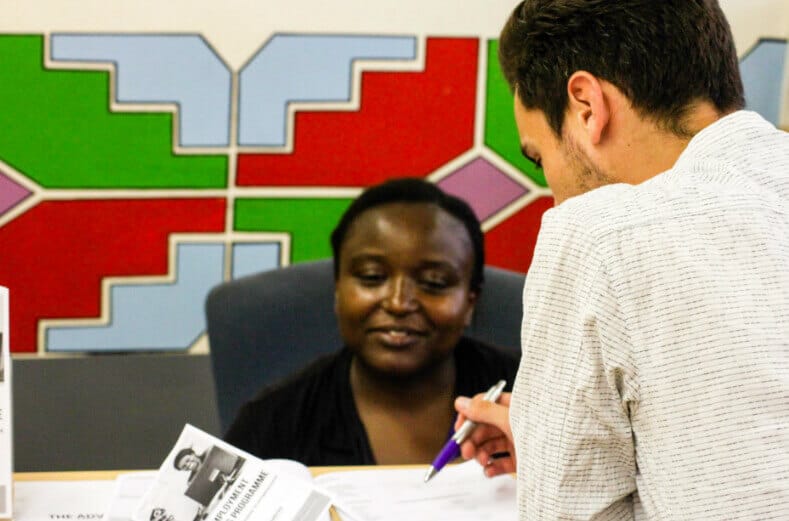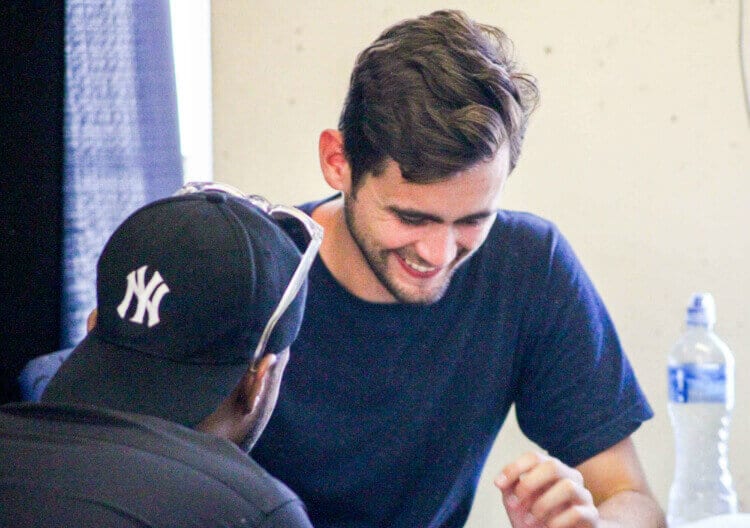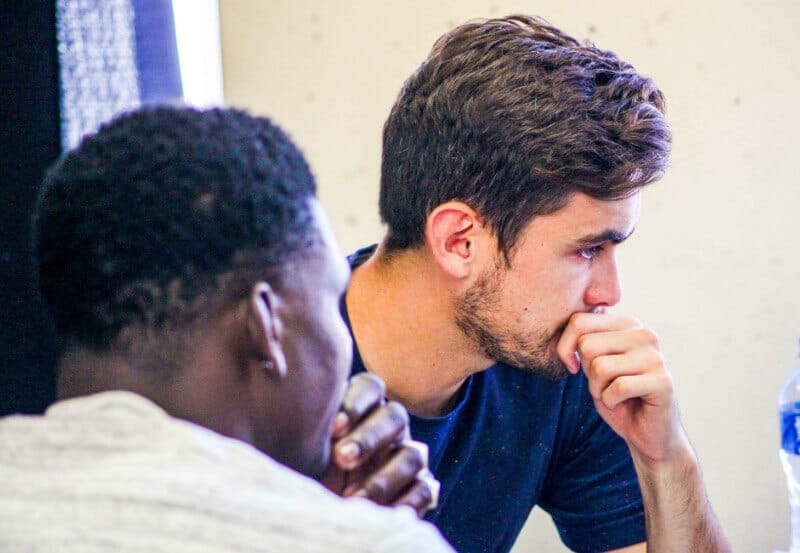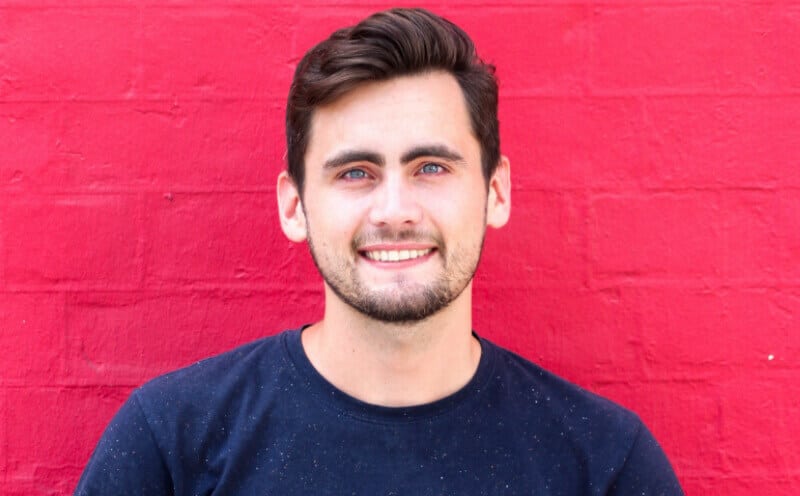If you hear that your Effort made things work out, it gives you a Feeling of Satisfaction
Emiel Renier finished his master’s degree in European and International law in Belgium. He was looking for practical field experience. He came to Cape Town to volunteer for six months in the Advocacy Programme at the Scalabrini Centre of Action. Scalabrini works with asylum seekers, refugees, and migrants. We joined him for a day to see what it’s like to be part of this nonprofit organization. We also saw how he helps migrants, refugees and asylum seekers on a daily basis by providing them with paralegal advice and practical assistance.
Tasks and Duties
As a volunteer at Scalabrini’s Advocacy Programme, Emiel provides supervised paralegal advice, practical assistance and referrals to vulnerable individuals and groups from refugee, migrant and asylum seeker communities, Master’s their rights are being respected. Emiel assists with providing information on the asylum application process, documentation and following-up on hate crimes/xenophobic incidents. He also contributes to researching South African legislation and refugee issues in Africa.
It is 8.30 in the morning when we enter the Cape Town office where 25-year-old Emiel is volunteering. Emiel takes us upstairs, we pass the reception, and we arrive at his desk. This is where he spends most of his day. He starts with checking in with colleagues and reading his emails. Next, he begins the main part of his day: seeing people who seek assistance at Scalabrini Centre.
Emiel and his colleagues also work on the weekly ‘press-review’. For this, they search for local, regional, and international news about refugees, asylum seekers, and migration. After all, any development can have an impact on refugee and migrant communities in South Africa. “This can vary from political instability to diseases or even war,” says Emiel.
At 9.00 the first client arrives. Emiel introduces himself and begins to take down the client’s details. Simultaneously, he tries to figure out why the individual is seeking assistance. The clients he sees can be from any country in Africa or further afield. Some have been in South Africa for a while, while others are new to the country. Emiel talks them through the various processes related to South Africa’s asylum and refugee system. He also explains the various barriers that asylum seekers, migrants or refugees face in South Africa. A consultation usually takes between 30 and 45 minutes, “but sometimes, it takes up to two hours. It really depends on the client and the problems he or she has. Different situations call for different forms of advice and information,” says Emiel.
Do you need help to find the right Internship abroad? Follow these six easy steps that will help you.
Developing Skills
Emiel’s language skills turn out to be really useful when the third client of the day comes in. As usual, Emiel starts in English, but when he notices the client is struggling to speak, he turns to French. “Quite a lot of the clients come from areas where French is their mother tongue. I also sometimes take over clients from colleagues if I hear they can only speak French. It makes things easier for everyone.”
According to Emiel, his time at Scalabrini has not only enhanced his skills and personal development, but it has also opened his eyes. He says: “My time here has awakened me to take notice of the problems South Africa faces regarding migrant and refugee rights. It’s also been a reality check. The articles about problems in different parts of the world regarding refugees and migrants have become more of a general statement in the everyday newspaper. When I started here, I was suddenly sitting across from people with real problems and asking for help, which can be quite confronting.”
Making an Impact
Emiel and the staff at Scalabrini are doing their utmost to assist people and provide them with information. That way, they can make informed life choices and be more aware of South Africa’s laws. This includes the rights and responsibilities they are entitled to. The impacts that the staff can make are varied.
On a daily basis, it may seem like the impact is relatively small; “If I look at the impact I can personally make, it would be no more than at a micro level. I can only make a difference in a one-on-one situation for the person who is sitting directly in front of me. This often means that I make clients aware of the importance of certain documents that they need in order to help them further. However, I also call schools to explain someone’s situation resulting in a child being able to get access to education the next day. If you hear that your effort made things work out, it gives you a feeling of satisfaction.”
The impact on a macro level is generally only noticeable over the long term. Emiel acknowledges that when volunteering in an area like advocacy, “you have to realize that making an impact on a micro level is already very valuable at that moment for the individual client.”

Emiel has learned a great deal while volunteering at Scalabrini, including information about the ins and outs of South Africa’s asylum system and the practical and everyday barriers that many asylum seekers, migrants, and refugees face in South Africa. This volunteering experience has provided him with deep and practical experience, mostly the possibility to make a difference for Scalabrini’s clients and to put his theoretical skills and knowledge into practice. However, according to Emiel, this type of volunteering is not suitable for everybody and it is very important to be mentally strong, as well as having the ability to be empathetic and listen to individuals.
Keen to help Migrants and Refugees integrate into the South African Society? Check our Internship Opportunities.
Volunteers at the Scalabrini Centre of Cape Town play a critical role in the running of the Centre’s programmes on a day-to-day basis. “Emiel has really helped us considerably in his time here and I can see that he has learned a great deal as well,” said Corey Johnson, the Advocacy Programme Manager. “Volunteers are supervised and play an important role in our programme by providing advice and appropriately referring individuals. The level of insight in Emiel’s questions and guidance shows that his time at Scalabrini has aided in his professional and practical knowledge of refugee and asylum issues.”
Future Plans
Emiel came to Cape Town because he wanted to put his theoretical knowledge into practice. “In South Africa, there is a big difference between how things are stated in the law and how things work out in reality when talking about the rights of migrants and refugees. However, this also means that you can get a lot of practical experience due to the scale of the challenges.” Emiel is glad he got a chance to see the reality with his own eyes. He really enjoyed his experience in Cape Town. At the end of March, he, unfortunately, had to go back to Belgium, although he says he might not be there for too long: “I definitely want to work abroad, preferably somewhere where I can be involved with the protection and rights of refugees.”
Other interesting Reads:
• The life of a Cape Town intern
• Why do an internship in Cape Town?
• Why do an unpaid internship?











